Millions of litres of radioactively contaminated water are stored in water tanks at the tsunami-crippled nuclear power plant in Okuma, Fukushima, in Japan. Keystone / Kimimasa Mayama Researchers in Zurich have developed a filter membrane made of whey proteins and activated carbon that can clean contaminated radioactive water. They hope to deploy their invention at the site of the Fukushima nuclear disaster in Japan. Four years ago, scientists at the federal technology institute ETH Zurich unveiled a filter membrane that could remove metals such as uranium, gold and platinum from water. In a new study, published in the journal Environmental Science: Water Research & Technology, the team has gone a step further to demonstrate how their membrane can also remove
Topics:
Swissinfo considers the following as important: 3.) Swiss Info, 3) Swiss Markets and News, Featured, Latest News, newsletter
This could be interesting, too:
Nachrichten Ticker - www.finanzen.ch writes Die Performance der Kryptowährungen in KW 9: Das hat sich bei Bitcoin, Ether & Co. getan
Nachrichten Ticker - www.finanzen.ch writes Wer verbirgt sich hinter der Ethereum-Technologie?
Martin Hartmann writes Eine Analyse nach den Lehren von Milton Friedman
Marc Chandler writes March 2025 Monthly

Millions of litres of radioactively contaminated water are stored in water tanks at the tsunami-crippled nuclear power plant in Okuma, Fukushima, in Japan. Keystone / Kimimasa Mayama
Researchers in Zurich have developed a filter membrane made of whey proteins and activated carbon that can clean contaminated radioactive water. They hope to deploy their invention at the site of the Fukushima nuclear disaster in Japan.
Four years ago, scientists at the federal technology institute ETH Zurich unveiled a filter membrane that could remove metals such as uranium, gold and platinum from water.
In a new study, published in the journal Environmental Science: Water Research & Technology, the team has gone a step further to demonstrate how their membrane can also remove radioactive elements from hospital effluents.
Laboratory tests show that the filter membrane can effectively remove radionuclides used in the medical field, such as technetium-99m, iodine-123 and gallium-68, from water. It is 99.8% successful after just one filtration step.
The researchers also tested their invention with a sample of effluents from a Swiss hospital, which contained radioactive iodine-131 and lutetium-177. It removed both elements almost completely from the water.
“Thanks to our membrane, it’s possible to enormously reduce the amount of waste and to store the radiating elements as compact, dry solids,” Raffaele Mezzenga, professor of food and soft materials at ETH Zurich, said in a statement on Tuesday.
Swiss pilot project and Fukushima
As a next step, the researchers are planning a pilot project with a large Swiss hospital that wants to test the filtration of radioactive effluents.
They have also been in talks with a Japanese company involved in clean-up work at the site of the Fukushima nuclear disaster to treat a sample of contaminated water.
“If our assumption is correct, the filter membrane could massively reduce the volume of wastewater in Fukushima, meaning that no radioactive water would have to be dumped into the Pacific Ocean,” Sreenath Bolisetty, co-developer of the membrane, declared.
He explained that the filters saturated with the highly radioactive elements can be stored as solids, for example in the same place as used fuel rods from nuclear power plants.
The filter membrane is relatively easy to produce, say the scientists. Whey protein is a waste product of the dairy industry that is cheap and readily available. The activated carbon component is also found easily.
Tags: Featured,Latest news,newsletter








